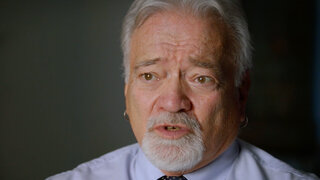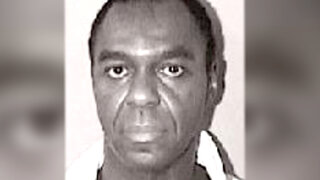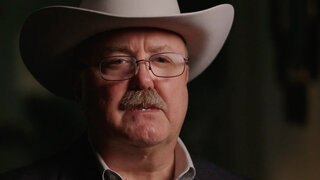Create a free profile to get unlimited access to exclusive videos, breaking news, sweepstakes, and more!
Exhumation Helps Prove A Woman Was Drugged And Killed Before Her House Was Set On Fire
Investigators were baffled when they discovered LaQuinta Smith, found dead in her burning residence, had actually died before the fire began.
In North Bend, Oregon, a working-class community known for logging and salmon fishing, 36-year-old LaQuinta Smith was a wife and mother whose fun-loving personality endeared her to family, friends, and her co-workers at a local Bi-Mart.
But in the early morning hours of May 20, 1999, LaQuinta’s life was tragically cut short. A police officer spotted smoke billowing from a residence. He called the fire department and entered the home. Before North Bend firefighters and EMS crews arrived, the officer found LaQuinta unconscious lying on a bed, fully dressed but barefoot.
“He grabbed her and dragged her outside … but found there was no pulse, so he attempted CPR,” Chief Gil Zaccarro, North Bend Police Department, told “Exhumed: Killer Revealed,” airing Sundays at 7/6c on Oxygen.
LaQuinta was pronounced dead at the hospital. Was the fire an accident? Was this a suicide? Or was foul play involved?
Officers began their investigation by talking with the victim’s husband, Alby Smith, then 38, whom she’d met about a decade and a half earlier. Alby, along with his teenage son, Tommy, from a previous marriage, and the couple’s son, Todd, were living in a different location at the time of the fire. Alby appeared to be shocked and distraught when he learned the news.
Investigators also focused on determining how the blaze began. Signs showed that the fire started at a metal furnace. Although there was no evidence of forced entry, an open container of pills in the bedroom caught their eye.
Could the sleeping pills be connected to why LaQuinta wasn’t roused by the fire? While sleep aids are not uncommon, the pills were not from Bi-Mart, which, according to witnesses, was where LaQuinta nearly exclusively shopped.
Alby’s knowledge of the pill bottle in his initial conversation, which police didn’t reveal, would later raise a red flag.
The emergency room doctor believed that LaQuinta died from smoke inhalation, but an autopsy determined otherwise. There was no soot in her mouth, throat, or lungs, and blood and urine tests were negative for carbon monoxide, which showed that she was dead before the blaze began. Bruises were also found on LaQuinta’s upper right arm.
“It was pretty obvious that it was a handprint. You could almost see the fingers,” said Det. Dale Oester, now retired from the Oregon State Police Department. “She didn't do this to herself.”
The medical examiner ruled the cause of death as undetermined. But to investigators it appeared to be a homicide.
Police dug deeper into LaQuinta and Alby’s relationship and discovered that he had a girlfriend on the side.
“He told us that [he and LaQuinta were] in fact separated. But they were working their problems out,” said Chief Gil Zaccarro, North Bend Police Department.
He also said his wife was dealing with depression, a claim that bolstered the possibility of suicide. A book about depression was also found in LaQuinta’s home.
But when investigators spoke with LaQuinta’s intimates and co-workers they got a different story. They said she’d never take her own life and that she was ready to divorce Alby. Was Alby devoted to a reconciliation — or lying?
But when Todd was interviewed by detectives he told them that on the morning his mother died he had heard his father snoring in his bedroom around 1 a.m. Todd said that Alby had responded to police knocking on their door at 4:30 a.m. That gave Alby an alibi.
As detectives worked the case, they learned that LaQuinta had had a fling of her own. She’d spent the night with a man she met at a party not long before she died. The man admitted his brief encounter with LaQuinta to police and agreed to a polygraph. He was ruled out as a suspect.
Investigators were back at square one. But a new lead emerged. Debbie Rudder, the victim’s best friend, noticed that LaQuinta’s treasured rings — one with birthstones, one in gold — were missing. LaQuinta, she said, never took them off – except to wash dishes.
Surveillance footage from her job confirmed LaQuinta had been wearing the rings the night of the fire.
Investigators learned from LaQuinta’s friend that Alby turned up with the rings after the fire. He said that LaQuinta had asked him to get them cleaned for her. But how did Alby have the rings if LaQuinta was wearing them the night she died?
The friend also shared a chilling story: She claimed LaQuinta had told her she had came home one day and found that Alby, who had a key, had let himself in. He offered to cook dinner and “he poured her a glass of tea,” said ADA Amanda Marshall, of the Coos County Prosecutor’s Office.
LaQuinta had told the friend the tea tasted “weird” and she felt groggy after. She thought Alby had drugged the drink and had sex with her, the friend said, according to Marshall.
On May 26, Alby was brought back for more questioning. He maintained that he had nothing to do with her death, and came up with another story to explain why he had his wife’s rings, which he put in her casket to be buried with her. However, he failed a polygraph test.
There were many red flags and nagging inconsistencies. But police couldn’t make an arrest for a number of reasons. The cause of death wasn’t listed as homicide, police lacked direct evidence tying him to a crime, and, thanks to Todd, he had an alibi.
Police considered the bottle of sleeping pills found at the scene. Could LaQuinta have been drugged? The first autopsy hadn’t tested for that. In mid-June, a few weeks after her burial, investigators took the extreme step of exhuming LaQuinta’s body to get answers.
The fact that LaQuinta’s rings had been buried with her was immediately evident. And a toxicology report showed the presence of sedatives in LaQuinta’s system — not enough to kill her but enough to render her unable to resist being smothered, said Marshall. That was key to the investigation.
According to LaQuinta’s friend’s statement, Alby had drugged his wife before — and so he could have done that before the fire.
When investigators re-interviewed Todd, he admitted he was a very sound sleeper and couldn’t say with certainty that his father never left home after 1 a.m. That punched a hole in Alby’s alibi.
Alby Smith was arrested on March 31, 2000.
Investigators worked to bolster their case and learned that Alby was the sole beneficiary of an insurance policy on the house if LaQuinta was deceased.
“It appears that the primary motive for this homicide and arson was financial,” said Marshall.
In June 2001, Alby Smith’s trial began. Testifying on his own behalf, Alby maintained that he loved his wife and planned to get back together with her.
It didn't work. On June 21, 2001, Alby was found guilty of arson and murder. He was sentenced to a total of 32 years in prison.
To find out more about the case, watch “Exhumed: Killer Revealed,” airing Sundays at 7/6c on Oxygen or stream episodes here.























